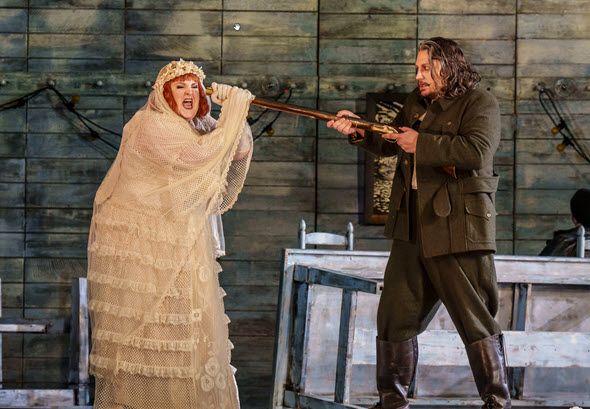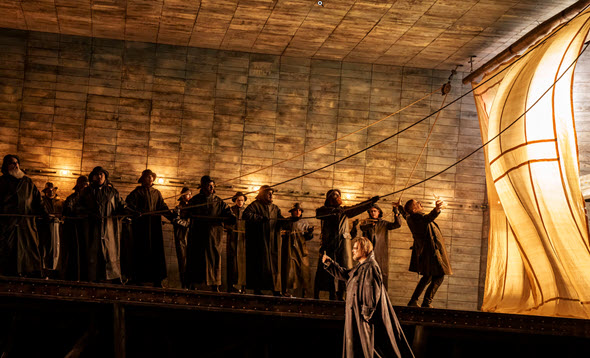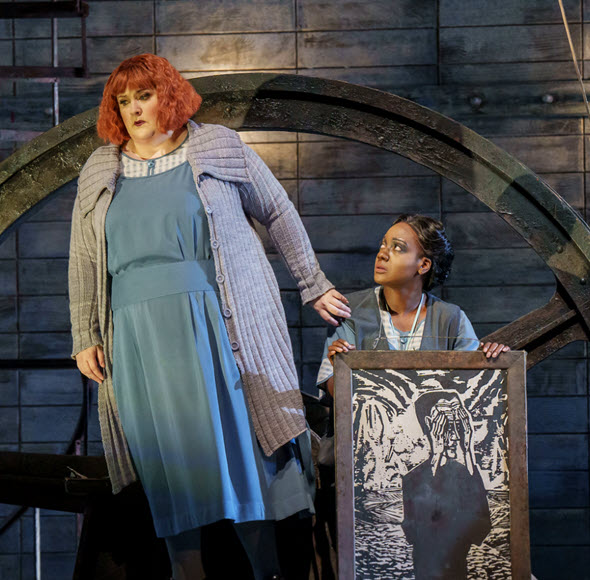‘Flying Dutchman’ at Lyric Opera: A dark tale made brilliant by the voices of a doomed pair
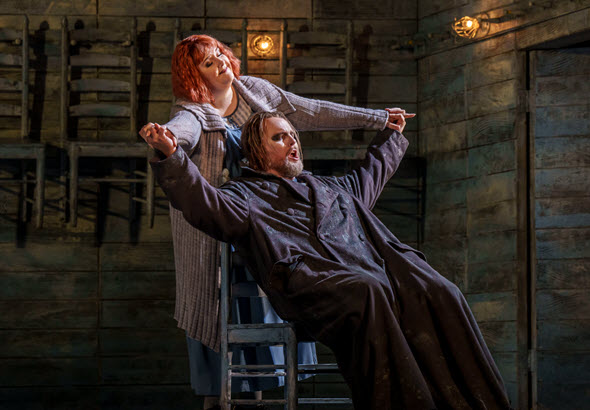
Tomasz Konieczny portrays the accursed sea captain with Tamara Wilson as Senta in Lyric Opera’s production of ‘The Flying Dutchman.’ (Todd Rosenberg photos)
Review: “The Flying Dutchman” by Richard Wagner, at Lyric Opera of Chicago through Oct. 7. ★★★★
By Lawrence B. Johnson
The sorry plight of Wagner’s Senta, the lass who obsesses about the accursed sea captain in “The Flying Dutchman,” always puts me in mind of Schubert’s plaintive Gretchen at the spinning wheel, bereft of peace and heavy of heart. “Dutchman” is one dark opera, populated by distraught or deeply neurotic characters for whom there is no relief and never will be. Still, there is a certain radiance to the bleakness and it suffuses a compelling account of Wagner’s music-drama at Lyric Opera of Chicago.
Setting aside a few problematic details in a generally effective production created by Christopher Aiden, a bold staging underpins the opera’s psychological skew and tumult, which also resonates authentically in the voices of a superb cast and in the graphic conducting of Lyric music director Enrique Mazzola.
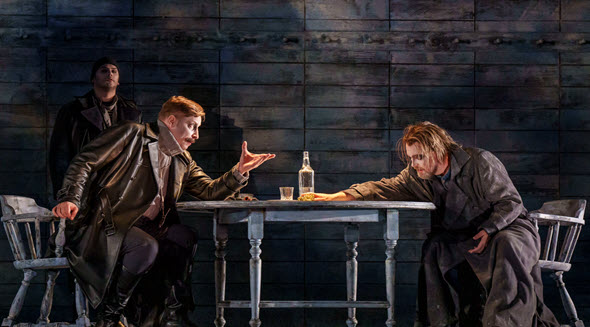
Senta’s father Daland (Mika Kares, left) and the Dutchman (Tomasz Konieczny) strike a deal for Senta’s hand.
The Dutchman, who has no other name, long ago committed an offense that cast him into the devil’s sway. The penalty requires him to sail the seas without respite in seven-year stints until in his allowed landings of a single day to find a woman who will marry him and pledge eternal faithfulness. His latest docking brings him face to face with Daland, another sea captain. When Daland hears the Dutchman’s story and glimpses the astonishing treasures the unhappy man has amassed in his endless voyages, he bargains his daughter Senta as bride-savior in exchange for a share of that sparkling largesse.
But the girl already possess a psychic connection to the Dutchman. Having become transfixed by a portrait of him and in her heart committed to his redemption, Senta is just waiting for him to show up and claim her. There are complications, however, starting with her prior pledge to a simple huntsman called Erik, and both Senta’s vision and the Dutchman’s latest hope ultimately come crashing down together.
“The Flying Dutchman,” written in 1843, was Wagner’s breakthrough opera, his first real masterpiece and the first in which he wove into the orchestral score musical motifs (or leitmotifs) associated with specific characters or ongoing elements of the story to enrich the narrative tapestry. One hundred-eighty years later, it remains potent, even scary, stuff.
In the title role, Polish bass-baritone Tomasz Konieczny offers a darkly magical portrait of a man who knows that hope is an ever-receding illusion. Grand of voice and beguiling in aspect and presence, Konieczny’s Dutchman rules more than Senta’s imagination; he commands the stage. This lost soul manages to be at once mystical and substantial, a condemned spirit in the flesh of pathos.
And he is well matched in American soprano Tamara Wilson’s vocally spectacular Senta, whose beautiful clarion sound imbues Wagner’s music and the possessed girl’s resolve with stunning intensity. At every turn, Wilson displays a ringing, ravishing voice. No doubt it’s only because of Wagner’s through-composed music, without cadences where the audience might cut loose, that Wilson’s glorious singing did not bring down the house more than once at the performance I heard. In the end, however, a tsunami of pent-up enthusiasm shook the house..
As Senta’s opportunistic father Daland, the Finnish bass Mika Kares provides, if not comic, at least foolish relief, with his assured singing matched by his stagecraft. Caught up, or more accurately discarded, amid the passionate surge of the Dutchman and Senta is Erik the huntsman, who reasonably believes himself Senta’s future husband. American tenor Robert Watson, a singer of pliant technique and finely gauged sensibility, brings palpable disbelief and heartbreak to Erik’s realization that Senta no longer even sees him as she loses herself in the image, and then the actuality, of the elusive stranger.
The Lyric Opera Chorus, men and women, dispatched their diverse and formidable assignments with high spirits and vocal distinction. The Lyric Opera Orchestra performed competently but without quite capturing the singular luster of Wagner’s music, a marginal success that reflected the unevenness of Mazzola’s approach to the work. If by and large, Mazzola conveyed the opera’s urgency and dark brilliance, at times his tempos felt sluggish and the narrative line fell slack.
What immediately meets the eye as the curtain rises is the steep left-to-right slant of the stage: the pitched deck of a ship heavily buffeted by a storm. As Daland’s crew collectively reels with the rolling sea, the evocation of storm is gripping, and with that conveys a vivid sense of place and circumstance. But as this is a unit set, we must also, as it were, roll with that pitched platform through all the scenes that ensue — not an implausible proposition in light of the emotional upheaval that shapes the opera.
Aiden’s concept — or perhaps I should make that Konzept — of “The Flying Dutchman” is fraught with warmed-over tokens of Nazi terrorism and Jewish oppression. It all seems terribly calculated and arbitrary, not to say extraneous and irrelevant. Those things are simply not what this opera is about. Maybe the looniest conceit is the image of the Dutchman that so bewitches Senta. The woodcut bears the unmistakable look of Edvard Munch’s 1893 painting “The Scream,” except that the ghoulish figure in the original has been replaced by a mug that most people would identify right away as Frankenstein’s monster.
And it probably bears noting that Aiden has come up with a novel way for Senta to perish — not by throwing herself into the sea as a sacrifice to free the Dutchman’s soul. I won’t play the spoiler, but it’s a far cry from Wagner’s idea of the girl’s death. And yet, to give Aiden his due, an argument can be made for her ending in the midst of such madness.
Related Link:
- Performance location, dates and times. Details at TheatreInChicago.com

